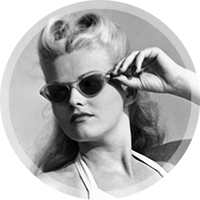

When I was sixteen and a budding film aficionado, I first saw Citizen Kane. Those are the optimal circumstances for such an event. They guarantee that you’ll be impacted with the full force of what that film really means: which is, namely, that anything is possible, if you’ve got enough courage and/or blissful ignorance to create it.
Seeing Citizen Kane was the first time it occurred to me that people made movies. That they didn’t just exist as as a natural part of the world, as my seven-year-old self assumed about The Wizard of Oz, or grow organically from our collective unconscious, as thirteen-year-old Jen considered The Empire Strikes Back. Orson Welles demonstrated, in flourish of magic tricks, that reality and truth were up for democratic debate and that film could be an extension of a individual’s voice in this debate as much as any other art form. It was, and is, a stunning and inspiring revelation.
Unfortunately, his lesson came with baggage, particularly for sixteen-year-olds. Welles made Citizen Kane at age twenty-five. One of the towering achievements of American cinema, perpetuated by a twenty-five-year-old wunderkind. In my youth, this was an imperative, a directive. A determination that if you didn’t reach the same lofty heights by the same age, well, you had probably failed somewhere.
Our culture is obsessed with youth. Figuring out exactly why would take far more time and sociological theory than I have at my disposal right now, so let’s simply accept that it is. And, yet, there’s an unceasing pressure to become something else beyond youth faster and faster. What do you want to be when you grow up? Pick a path. Plan college entrance exams in kindergarten. Plan preschool entrance exams before conception. There isn’t a second to waste. Wunderkinds are not the exception, but the rule to which to be aspired. If we stop for a second, someone else might get ahead of us, and therefore invalidate our worth.
A couple of months away from my thirty-fifth birthday, I’m appalled that I ever thought I should, or even could, reach any sort of success at age twenty-five. I’m sure in some cases it’s possible and perhaps quite nice. As a rule, however, the idea of early success, and early-formed certainty about what one’s life is to encompass, strikes me as absurd and destructive. I wish I had focused less on the concept of reaching arbitrary benchmarks and more on understanding who I was and what I wanted. I wish I had known that it’s never too late to do anything: to pick up a new skill, to switch paths, to fix the past. And that in many cases, it’s actually better to take on a goal when you’re old enough to know how the world works. The trick then becomes merging your earned experience with that fearless enthusiasm and reckless courage that came so easily in youth. It’s easier to jump off of a cliff when you don’t know what gravity is. But after you learn that, it doesn’t mean you still can’t jump. You just also learn how to make a glider.
I haven’t seen Citizen Kane in many years. These days, I probably think more about how life was not particularly kind to Welles after he made the film. It was the start of a career spent more in fighting for the opportunity to do what he wanted than doing what he wanted. It didn’t end well. I still treasure the boldness of Kane, its swaggering genius. But I’m comfortable knowing I missed that mark, and that what I bring into the world will have the full force of my own mature deliberation behind it. Growing up, sometimes, isn’t all that bad.